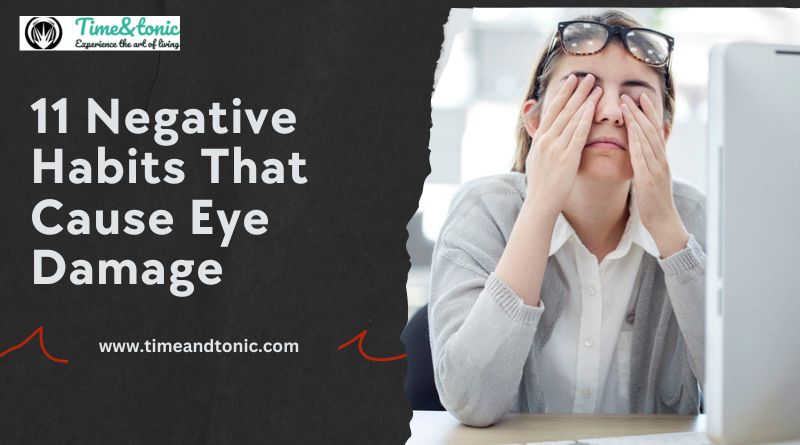11 Negative Habits That Cause Eye Damage
Our eyes are truly remarkable organs, allowing us to perceive the world around us in all its beauty and complexity. Yet, in our fast-paced modern lives, we often take our eyes for granted, subjecting them to a barrage of negative habits that can cause significant damage over time. From staring at screens for hours on end to neglecting proper eye care routines, these habits can take a toll on our precious vision.
In this blog, we will explore 11 Negative Habits That Cause Eye Damage. By the end, you’ll not only be aware of the potential harm these habits can cause but also armed with knowledge on how to protect your eyes for a brighter, clearer future.
Negative Habits That Cause Eye Damage
Prolonged Screen Time:

In today’s fast-paced digital age, our lives are intricately intertwined with screens. We use computers for work, smartphones for communication, and televisions for entertainment. These devices have become indispensable, but the extensive screen time associated with them can take a toll on our eyes. Prolonged exposure to screens often leads to a condition known as digital eye strain, or computer vision syndrome. This syndrome is characterized by a range of uncomfortable symptoms, including eye fatigue, dryness, blurred vision, and headaches.
Digital eye strain occurs because when we gaze at screens, we tend to blink less frequently. This reduced blinking can cause our eyes to dry out and become irritated. Additionally, the constant focus on digital content can lead to eye fatigue as the eye muscles work harder to maintain focus. Over time, these issues can contribute to long-term eye damage, making it essential to address this habit.
Also Read: Power-Packed Healthy Snacks To Melt Belly Fat
Neglecting the 20-20-20 Rule:

The 20-20-20 rule is a simple but effective technique to combat the adverse effects of prolonged screen time. Failing to adhere to this rule can exacerbate the discomfort associated with digital eye strain. The principle behind the rule is straightforward: every 20 minutes of screen use, take a 20-second break, and shift your focus to something at least 20 feet away.
This practice serves as a mini-respite for your eyes. It allows your eye muscles to relax and readjust, reducing the strain caused by constant screen exposure. Moreover, following the 20-20-20 rule can alleviate symptoms like dryness and eye fatigue. Incorporating this simple habit into your daily screen routine is a small change that can significantly contribute to the overall health of your eyes.
Inadequate Lighting:

The lighting in our surroundings plays a crucial role in how our eyes function. Inadequate lighting, such as reading or working in dimly lit environments, forces our eyes to work harder to see clearly. This extra effort can lead to eye strain and discomfort, particularly when reading fine print or working on intricate tasks.
Properly illuminated spaces are essential for maintaining good eye health. Adequate lighting not only reduces eye strain but also enhances visual clarity. When reading or working, ensure that your lighting is evenly distributed and adjusted to suit the task at hand. By optimizing your environment, you can significantly reduce the strain on your eyes and promote their well-being.
Rubbing Your Eyes:

Rubbing your eyes may seem like a harmless reflex, especially when they feel tired or itchy. However, this seemingly innocuous habit can introduce harmful bacteria and irritants into your eyes. Rubbing your eyes with dirty hands can lead to infections, conjunctivitis (pink eye), or even corneal scratches.
To protect your eyes, it’s crucial to resist the urge to rub them vigorously. If your eyes are irritated or itchy, try using artificial tears or a clean, damp cloth to gently soothe them. By avoiding the habit of rubbing your eyes, you can prevent potential eye damage and maintain their health.
Also Read: Nourishing the Skies with Healthy Flight Snacks
Ignoring Regular Eye Exams:

Many individuals only seek eye exams when they notice a decline in their vision or experience discomfort. However, waiting for symptoms to appear can delay the detection of underlying eye conditions. Regular eye exams are vital for identifying problems early, allowing for timely treatment and preservation of your vision.
Conditions like glaucoma and cataracts often develop gradually and may not display noticeable symptoms until they reach an advanced stage. By scheduling regular eye exams, typically recommended every one to two years, you can ensure that any potential issues are detected early, enabling effective intervention and maintaining optimal eye health.
Sleeping with Contact Lenses:

Sleeping with contact lenses in place is a common habit, but it can have serious consequences for your eye health. Contact lenses act as a barrier to the flow of oxygen to the cornea, the clear front surface of the eye. When you sleep with contact lenses, you restrict the cornea’s oxygen supply, creating an environment where harmful bacteria can thrive.
This habit significantly increases the risk of eye infections, such as microbial keratitis, a painful condition that can lead to vision loss if left untreated. To safeguard your eyes, always remove your contact lenses before bedtime, and follow proper cleaning and disinfection guidelines as recommended by your eye care professional.
Smoking:

Smoking is detrimental to your overall health, but it also poses a significant threat to your eyes. It is linked to various eye diseases, including cataracts, age-related macular degeneration (AMD), and diabetic retinopathy. These conditions can lead to vision impairment and even blindness.
The harmful chemicals in tobacco smoke damage the delicate structures within the eye, such as the lens and the retina. Quitting smoking is not only beneficial for your overall well-being but also crucial for preserving your eye health. By kicking the smoking habit, you reduce the risk of developing vision-threatening conditions and improve your chances of maintaining clear and vibrant eyesight.
Using Expired Eye Drops:

Eye drops are commonly used to relieve dryness, redness, and irritation. However, using expired eye drops can be counterproductive and potentially harmful. Over time, the effectiveness of eye drops can diminish, and preservatives may break down, leading to contamination.
Before applying any eye drops, check the expiration date on the packaging. Expired eye drops may not provide the relief you seek and could introduce unwanted contaminants into your eyes. To ensure optimal eye health, always use fresh, unexpired eye drops as directed by your eye care professional.
Poor Diet Choices:

The foods we consume play a significant role in our overall health, including the health of our eyes. A diet lacking in essential nutrients, such as vitamins A, C, and E, as well as minerals like zinc and omega-3 fatty acids, can contribute to eye problems. These nutrients are vital for maintaining good vision and protecting against eye diseases.
Incorporate a balanced diet rich in fruits, vegetables, and fish to support your eye health. Foods like carrots, leafy greens, citrus fruits, and fatty fish like salmon and tuna are packed with eye-boosting nutrients. By making wise dietary choices, you can provide your eyes with the nourishment they need to function optimally and reduce the risk of eye-related issues.
Overlooking Protective Eyewear:

Engaging in various activities, such as DIY projects, sports, or home repairs, can expose your eyes to potential hazards. Failing to use appropriate protective eyewear during these activities puts your eyes at risk of injury from flying debris, chemicals, or impact.
Investing in the right safety glasses or goggles for specific tasks is a simple yet effective way to safeguard your eyes. These protective eyewear options are designed to provide a barrier between your eyes and potential dangers, reducing the likelihood of accidents that could result in eye damage or vision loss.
Also Read: Low-Carb Grocery Dessert for a Healthier Sweet Tooth
Not Cleaning Eyeglasses:

If you wear eyeglasses, maintaining their cleanliness is essential for clear vision and eye comfort. Dirty or smudged eyeglasses can distort your vision, causing you to strain your eyes to see properly. Continuously straining your eyes can lead to discomfort and, over time, exacerbate eye strain.
To ensure optimal clarity and comfort, make it a habit to regularly clean your glasses with a microfiber cloth and lens cleaner specifically designed for eyeglasses. This straightforward task not only keeps your vision sharp but also contributes to the overall well-being of your eyes.
In the hustle and bustle of our daily lives, safeguarding our eye health often takes a backseat. However, as we’ve seen in this blog, the negative habits we engage in can have long-lasting and detrimental effects on our vision.
From digital eye strain to neglecting regular eye exams, it’s crucial to recognize these habits and take steps to mitigate their impact. By incorporating simple changes into our daily routines, such as practicing the 20-20-20 rule or using protective eyewear, we can significantly reduce the risk of eye damage.
Remember, our eyes are precious, and it’s our responsibility to care for them. So, let’s break free from these harmful habits and ensure a lifetime of clear and vibrant vision.
FAQs
The 20-20-20 rule is a simple technique to reduce digital eye strain. Every 20 minutes, take a 20-second break and focus on something at least 20 feet away. This practice helps relax your eye muscles and prevent eye fatigue when working on screens for extended periods.
It is recommended to have a comprehensive eye exam every 1-2 years, even if you don’t have vision problems. Regular eye exams can detect early signs of eye diseases and ensure your eyes are in optimal condition for years to come.




